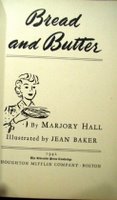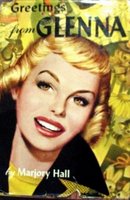Bread and Butter

"Bread and Butter," by Marjory Hall, 1942
Main character: Laura Lou Nott (no, really)
Career: Bake shop owner
Gael's grade: B, for somewhat of a stiffness and dryness, which perhaps comes from the book being of the 1940s as opposed to later CRFYMs from the 1950s.
Trauma #1: Laura Lou's friends are all away at school or jobs, and she's left behind, unable to afford college. Her mother is busy running an inn, and Laura Lou has been given the opportunity to run a small bake shop that adjoins it. But for two months she kicks around and does nothing, expecting her parents to push her into it, or something. "Guess I've just been waiting for Mamma to tell me what to do and why." she says at one point. She's also lost touch with her friend, Roz, but in true happy-ending fashion, they come back together by the end of the book.
Trauma #2: Laura Lou looks in the mirror one day and decides she's a mess -- she wears glasses, has messy hair, and has gained a whopping EIGHT POUNDS (over what time period is never quite clear). She enlists Cilla, a P.G. (not "pregnant," here it stands for "post-graduate") who's writing her thesis on weight control. Her brilliant advice? "Easy on calories, and a few exercises. And the best exercise, in case no one's told you, is shaking your head slowly from side to side when hot fudge sundaes are offered." (One can only imagine that her thesis will be filled with such outstanding tidbits of wisdom.)
Trauma #3: A competitor, Hugo Hatch, opens another bake shop in Laura Lou's town of Porthaven. Her food is better -- he buys his bread rather than baking it -- but people still flock there. Laura Lou tries to compete by making non-baked goods ("why can't we have chicken pies, or creamed chicken, or vegetable soup, or fish chowder?") and offering deals. (None of this really matters when it turns out poor Hugo doesn't really want to run the shop, and he agrees to close down and sell Laura Lou his equipment.) Also, someone is prowling around her shop when it's closed. Alert Nancy Drew! (It turns out to be Hugo's senile old uncle, who means no harm.)
Signs o' the times:
1) "I cried like a pooh-baby," Laura Lou says at one point. Like a what? Is she four?
2) At one point, a guy named "Bozo" (not the clown), announces "I don't think Laura Lou is equipped to run an establishment of this type. She hasn't enough crust." Ha ha...ha?
3) "Imagine me forgetting ashtrays for all the rooms!" exclaims Laura Lou's mother about her inn. Yeah, just wait 50 years and no one will smoke any more.
4) Laura Lou hunts for a Christmas gift, and someone suggests "There's a trick pencil here, for a quarter, that's really awfully good. I think a man might like that." A trick pencil? Like...it's rubber and doesn't really write? Or...it does tricks like a dog? What man wouldn't want that?
Quote that says it all: "Just before they reached the cashier's desk they came to a pedestal with a small splashing fountain on it. Laura Lou went automatically to the right, Trudie to the left. When they came back together again, they said, in chorus, as they had since they were small girls, 'Bread and butter!' and burst out laughing."
Labels: bakery, Marjory Hall

